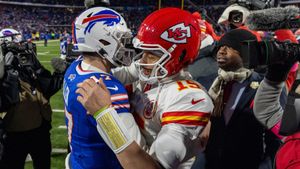President Donald Trump has reignited the long-standing intrigue surrounding the assassination of John F. Kennedy with his recent executive order aimed at declassifying documents related to this tragic event and others involving his brother Robert F. Kennedy and civil rights leader Martin Luther King Jr. The murder of President Kennedy on November 22, 1963, has remained the subject of intense speculation over the decades, marked by numerous conspiracy theories and questions about governmental knowledge.
"This is a big deal," Trump stated during the signing of the order, which he described as something many had been awaiting "for years, for decades." He proclaimed, "And everything will be revealed." This statement echoes the longstanding desire for transparency among citizens who have questioned the official narratives surrounding JFK's assassination, casting doubt on the lone gunman theory proposed by the Warren Commission.
Jack Schlossberg, JFK's grandson, expressed his skepticism about Trump's motivations, calling the declassification effort nothing more than using his grandfather as "a political prop." Schlossberg pointed out the tragedy of the assassination itself, stating, "The truth is far sadder than the myth - a tragedythat should not have happened. Not part of a grand inevitable scheme." He emphasized the need for respectful consideration of the legacy of JFK rather than political gain.
Trump's order directs both the Director of National Intelligence and the Attorney General to collaborate with White House officials to devise plans for releasing the JFK documents within 15 days, along with those related to the other two assassinations within 45 days. Notably, this move reflects back on how previous efforts to disclose these records have evolved. Under the law established in 1992, all records were mandated to be fully released by October 26, 2017, except if deemed harmful to national security.
Despite having previously ordered the release of nearly 2,900 documents, Trump chose to withhold others, citing national security concerns expressed by the CIA and FBI. He remarked, "I have no choice – today – but to accept those redactions rather than allow potentially irreversible harm to our nation's security." This indicates the complex balancing act between public interest and national security policies.
The CIA has consistently opposed the full release of remaining documents, explaining concerns about compromising intelligence sources and methodologies. Current CIA Director William Burns reiterated this position, noting, "All information about the assassination itself has been released to the public." He continued to express fears surrounding the release of additional documents, asserting potential risks to individuals identified within the files as well as the broader complications for U.S. intelligence operations.
The aftermath of JFK's assassination funneled widespread distrust, which has been aggravated by the shifting narratives over the years. Many Americans still believe Lee Harvey Oswald did not act alone, with conspiracy theories proliferated through media including books, documentaries, and films. Opinion polls suggest significant doubt connecting the assassination to any single actor, igniting countless theories incorporating elements from foreign actors to governmental agencies.
Trump’s actions arrive against the backdrop of previous attempts to overturn the secrecy surrounding such pivotal moments. For decades, public curiosity has been bolstered by hints of undisclosed government secrets. The historical significance of these documents weighs heavily on the continuing narrative of JFK’s assassination; many experts assert the potential for revelations, even if they may not bring about shocking conclusions.
Robert F. Kennedy Jr., the son of RFK and nephew of JFK, welcomed Trump's order, thanking the president on social media for trusting the American public when it came to disclosing these historical records. Kennedy Jr. has been outspoken about his skepticism of the official storyline surrounding his uncle's assassination, contributing another layer to the rich narrative of conspiracy and speculation. His comments serve to highlight the family connections and personal stakes entwined within this historical tragedy.
While many documents related to JFK’s assassination have made their way to the public sphere, researchers estimate approximately 3,000 records remain undisclosed, primarily held by the CIA. Increasing calls for full disclosure resonate as the nation reflects on this key moment of American history. Some documents already released have illustrated the behavior and directives of intelligence agencies at the time, including communications involving Oswald prior to the assassination.
After the shooting, the Warren Commission concluded Oswald acted alone, yet the overarching controversies have ensured the story remains alive and contentious. Scholars and enthusiasts alike continue to dissect every scrap of evidence available, hoping to glimpse insights buried beneath layers of redaction and secrecy.
Whether Trump's move leads to unprecedented disclosures or simply reiterates the officially accepted narratives surrounding JFK remains to be seen. What is undeniable is the significance of this moment, where the intersections of history, politics, and public desire converge once more, reanimting discussions of distrust and truth.



